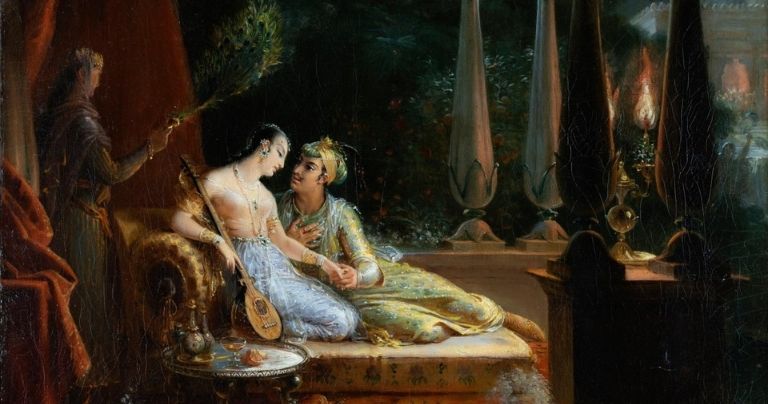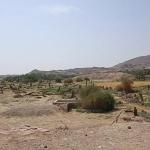I’ve been thinking about this article for a while, not really sure about how to begin with it because the character of Shahrzad, better known as Scheherazade, is perhaps the most known about regarding Arabic literature. One cannot speak about the Arabian Nights or The 1001 Nights without mentioning her name, maybe not even when speaking about the Middle East. Her fame creates an expectation, and that is intimidating for a writer. However, the more I thought about her, the more interested and eager to start working with her I was.

About the Name
Although her name is most commonly known in English as Scheherazade, there are many variations that have been used through time. This one, for starters, first appeared in English-language texts in 1801, borrowed from German usage, from Persian Shīrazād (Merriam-Webster, n.d.), which is also one of the earliest forms of the name along with Shahrzad (Irwin, 2004: 944; Ismail, 2009: 170).
Some scholars have argued that her name derives from the Middle Persian name Čehrāzād, which is composed of the words čehr (‘lineage’) and āzād (‘noble, exalted’). (Marzolph, 2017; Pellat, 2011; Hamori, 2012). The name can also be found as Šahrazād and Šahrāzād. However, for this article, I will be using the variant which is closest to the original Arabic, Shahrzad (شهرزاد), which is also the one used in The Arabian Nights (Mahdi and Haddawy edition).
Due to its origins, Shahrazad’s name would mean “Noble, exalted lineage”, or indicate she comes from such lineage. The later is also a possibility since she is the oldest daughter of the vizier and ends up becoming the queen of the sultan, who learns to love her and trust her, and mother of his three children. (Mahdi and Haddawy, 2008: 518).
A Patron Saint
According to Britannica (2021), a patron saint is:
saint to whose protection and intercession a person, a society, a church, or a place is dedicated. The choice is often made on the basis of some real or presumed relationship with the persons or places involved. (…) In some cultures national or local gods are the equivalent of patron saints.
I was reluctant to consider Shahrzad a Goddess since she is a mortal during the whole story. Some may argue that she can be considered one depending on how we look at her figure, maybe even a local god, but for me she is closer to the definition of a patron saint and that, since I wasn’t able to find evidence of any cult or belief related to her, think it is more respectable not to deify her figure. In the end, the matter depends on whoever decides to include her in their practice.
As I started working on this article, I thought about her as the perfect embodiment of cleverness, wisdom, and creativity. It was said about her that Shahrzad (Mahdi and Haddawy, 2008: 20-21):
“had read the books of literature , philosophy, and medicine. She knew poetry by heart, had studied historical reports, and was acquainted with the sayings of men and the maxims of sages and kings. She was intelligent, knowledgeable, wise, and refined. She was read and learned.”
When meditating with her, there was another word that resonated: Sovereignty. Shahrzad knew what was coming up on her by marrying the sultan, knew the fate of those who came before her, and still walked straight up to it because she also knew she was the master of her destiny. The sultan would use her body for his own satisfaction night after night, and her life could end at any moment, however, her body was just a means for an end to stay alive one more day.
As she weaves her tales of awe and wonder each night, the sultan is mentioned no more, whereas we always have the witty Shahrzad promising something better and more entertaining the next time. She becomes the central figure after starting as an intrepid heroine with a deathwish. She only had her sister to call upon for help after imposing her will on her father. Brave and fearless, this girl decided to use all the wisdom she had accumulated in her (possibly short) life to tame a beast that terrified the whole kingdom, and was willing to die trying.
For me, living in such unstable conditions, Shahrzad is the heroine I need, the one many would when in a dire time. She was able to walk right up to the storm, deal with it one night at the time, and figure out how to destroy it, and what’s more remarkable, she did it with zero violence. Always peaceful and patient, this sultana took control of the enraged man who killed many women after just one was cheated on him.
Shahrazad’s Prayer/Incantation
You who played with the sands of time,
Who saved another soul with every night,
Charming tongue of a cunning mind,
Guide my journey, Shahrzad.
You who charmed to stay alive,
Sharp tongue that slayed all pride,
Your body offered for all to survive,
Guide my journey, Shahrzad.
Noble Sultana with the kindest of hearts,
Wise empress, tamer of minds,
Voice of the wind, the desert, and the nights,
Guide my journey, Shahrzad.
References


















